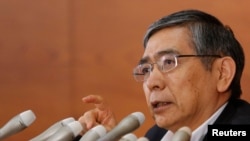Japanese stocks Friday rose to their highest levels since before the global financial crisis, following Tokyo's surprise decision to expand economic stimulus measures.
The benchmark Nikkei index surged 4.8 percent, ending at its highest level since November 2007. The dollar rose 1.2 percent against the yen, to levels not seen since January 2008.
Shares were also in positive territory elsewhere in Asia, including in Sydney, Seoul, Hong Kong, and Shanghai.
The rally was sparked by Tokyo's unexpected move to increase the money supply to help fight deflation.
The central bank decided to add an extra $182 billion to its current asset buying efforts, bringing the total to about $725 billion annually.
The central bank will also triple its purchases of exchange-traded funds (ETFs) and real-estate investment trusts (REITs) and buy longer-dated debt.
“Japan's economy continues to recover moderately as a trend and it’s expected to keep growing above its potential,” the central bank said. “But weak domestic demand after the sales tax hike and sharp falls in oil prices are weighing on prices.”
BOJ Governor Haruhiko Kuroda had been relentlessly optimistic about the prospects for economic recovery and for ending 15 years of deflation.
Data earlier on Friday showed Japan's inflation slowed for a second straight month in September and is just half the BOJ's target of 2 percent, while job growth showed signs of peaking.
Stripping out the effects of April's sales tax hike to 8 percent from 5 percent, annual core consumer inflation was 1 percent, data showed, casting further doubt on the BOJ's argument that its 2 percent inflation target will be met sometime next year.
On the fiscal front, Economy Minister Akira Amari said, “our cabinet's stance is to make full efforts as needed” to support the economy.
Underscoring the stark reality, household spending fell for a six straight month in September from a year earlier, while the job-availability rate eased from its 22-year high in August.
A Japanese government panel overseeing the Government Pension Investment Fund (GPIF) approved plans for the fund to raise its holding of domestic stocks to 25 percent of its portfolio from a current 12 percent, sources said on Friday.
The $1.2-trillion GPIF is under pressure from Prime Minister Shinzo Abe to shift funds towards riskier, higher-yielding investments to support the fast-aging population, and away from low-yielding Japanese government bonds.
It is unclear whether will move ahead with a planned second consumption tax increase next year.
Material for this report came from Reuters.





